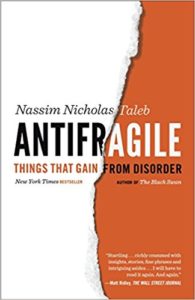
Nassim Nicholas Taleb
7 Star Transformative — As Important as Governing the Commons — LOCALIZE
For those who do not know this, Governing the Commons: The Evolution of Institutions for Collective Action earned Elinor Ostrom a Nobel Peace Prize in Economics. This book, by the author of Black Swan: The Impact of the Highly Improbable is of that caliber. A later book,, Skin in the Game: Hidden Asymmetries in Daily Life is easier to read — if you have time for only one go with the latter.
The core message of this book is that you cannot predict or control high impact low probability events, but you can downsize, localize, you can decentralize, and in so doing make much of the ecology “antifragile.”
Too big to fail should fail, will fail, should not be “rescued” by big government where those making the financial decisions have no skin in the game.
Two additional core messages or bottom lines in this book:
A. Practical knowledge is what really works, what really innovates, what really protects against catastrophe. Academic knowledge is weak second-hand puffery.
B. We need to get back to free-range children who do free-range learning that leads to free-range humans. Rote learning for 18-22 years in a classroom is no substitute for experience, and it does not teach resilience.
I have pages and pages of notes from this book, but here will just convey the high points. This is a hard book to read.
00 Antifragile ecologies thrive on volatility and wild cards — diversity is the opposite of stability, and much less fragile than cookie cutter one size fits all.
01 Need to restore individual and state rights, create country and city rights. Federal imperialism and top-down decision-making and regulation-making is a prescription for failure (Governing the Commons has a similar conclusion). The nation-state is sacreligeous and seeks to displace God while enslaving humans. This is very much a libertarian author (and a friend to Ron Paul).
02 Commerce is the path to peace –it breeds tolerance through prosperity. Banks should be nationalized and localized but investments should not be regulated. Education should not be normalized or regulated, it should be diversified to each localities desires.
03 Do not compromise your values. Identity politics and what Herbert Marcuse calls “repressive tolerance” (when “anything goes” there are no values”) is Satanic subversion — my interpretation not his words.
04 We must begin an era of simplification and an end to contrived cures that do not stem from holistic analytics and true cost economics — they are fake and have consequences.
05 Anti-Fragile by definition means that any vertical slice or horizontal layer must be able to fail without bringing the whole system down.
06 FORCED STABILITY REPRESSES SIGNALS OF NEEDED CHANGE AND ABSOLUTELY GUARANTEES IMPLOSION AT A FUTURE DATE.
07 There is no evidence strategic planning works — what does work is being open to all possibilities, being agile, being able to do rapid trial and error.
08 The best knowledge is on the edge, away from the “core curriculum,” you have to go get it, it will not be fed to you. The guilds using trial and error built the cathedrals, they were not built by academics and mathematicians.
09 Rationalism is reductionist, it ignores half or more of the knowledge base and cannot compute nuances.
10 PLAY is a vital means for practicing openness to optionality, branching.
11 TECHNOLOGY is fragile — it is a house of cards, over-complicated, too many lines of code that no one understands, it will fail in multiple difficult to diagnose ways (Charles Perrow makes this point in Normal Accidents: Living with High Risk Technologies). Engineers are generally autistic.
12 Intervention — whether government or medical or other — is generally a bad idea. Let karma play out, natural remedies, local remedies, are generally the easiest to devise, the least expensive, and the most likely to succeed.
13 Small business without advertising is the most honorable of enterprises. So-called professionals give up their ethics in order to stay in their profession. Similarly small communities foster ethics and leverage shame — accountability remains at a human level (Lionel Tiger makes this point in The Manufacture of Evil: Ethics, Evolution and the Industrial System).
14 Big data is best at debunking it is not good at confirming or predicting.
15 The more complex public government becomes the easier it is for its politicians and bureaucrats to scam the public. The two party system is a statis system that is not at all helpful in understanding or defending the public interest.
16 This book forced me to rethink the theory and practice of intelligence, which cannot be said of any other books, and certainly not those pretentious academic publications titled “theory and practice of intelligence.” The author stomps the analytic function as currently practiced into the dirt, and provides a most useful pump for pervasive distributed overt human intelligence at the street corner level.
The book includes a useful glossary.
This is a master's class unlike anything one could obtain at a university but the author does teach quarter time at the New York University Tandon School of Engineering.



